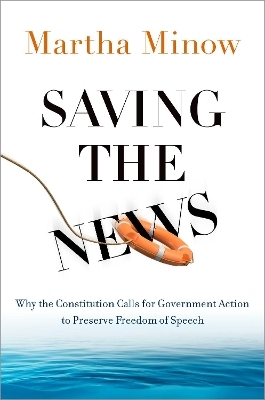
Saving the News
Why the Constitution Calls for Government Action to Preserve Freedom of Speech
Seiten
2021
Oxford University Press Inc (Verlag)
978-0-19-094841-2 (ISBN)
Oxford University Press Inc (Verlag)
978-0-19-094841-2 (ISBN)
A detailed argument of how our government has interfered in the direction of America's media landscape that traces major transformations in media since the printing press and charts a path for reform.
In The Changing Ecosystem of the News, Martha Minow takes stock of the new media landscape. She focuses on the extent to which our constitutional system is to blame for the current parlous state of affairs and on our government's responsibilities for alleviating the problem. As Minow shows, the First Amendment of the US Constitution assumes the existence and durability of a private industry. Although the First Amendment does not govern the conduct of entirely private enterprises, nothing in the Constitution forecloses government action to regulate concentrated economic power, to require disclosure of who is financing communications, or to support news initiatives where there are market failures. Moreover, the federal government has contributed financial resources, laws, and regulations to develop and shape media in the United States. Thus, Minow argues that the transformation of media from printing presses to the internet was shaped by deliberate government policies that influenced the direction of private enterprise. In short, the government has crafted the direction and contours of America's media ecosystem.
Building upon this basic argument, Minow outlines an array of reforms, including a new fairness doctrine, regulating digital platforms as public utilities, using antitrust authority to regulate the media, policing fraud, and more robust funding of public media. As she stresses, such reforms are not merely plausible ideas; they are the kinds of initiatives needed if the First Amendment guarantee of freedom of the press continues to hold meaning in the twenty-first century.
In The Changing Ecosystem of the News, Martha Minow takes stock of the new media landscape. She focuses on the extent to which our constitutional system is to blame for the current parlous state of affairs and on our government's responsibilities for alleviating the problem. As Minow shows, the First Amendment of the US Constitution assumes the existence and durability of a private industry. Although the First Amendment does not govern the conduct of entirely private enterprises, nothing in the Constitution forecloses government action to regulate concentrated economic power, to require disclosure of who is financing communications, or to support news initiatives where there are market failures. Moreover, the federal government has contributed financial resources, laws, and regulations to develop and shape media in the United States. Thus, Minow argues that the transformation of media from printing presses to the internet was shaped by deliberate government policies that influenced the direction of private enterprise. In short, the government has crafted the direction and contours of America's media ecosystem.
Building upon this basic argument, Minow outlines an array of reforms, including a new fairness doctrine, regulating digital platforms as public utilities, using antitrust authority to regulate the media, policing fraud, and more robust funding of public media. As she stresses, such reforms are not merely plausible ideas; they are the kinds of initiatives needed if the First Amendment guarantee of freedom of the press continues to hold meaning in the twenty-first century.
Martha Minow is Professor of Law and former Dean of Harvard Law School. She is the author of In Brown's Wake (Oxford, 2010).
Preface, by Newton Minow
Introduction
Chapter 1: News Deserts, Echo Chambers, Algorithmic Editors, and the Siren Call of Revenues
Chapter 2: News Production and Distribution in the United States: Private Industry and Government Contributions
Chapter 3: Does the First Amendment Forbid, Permit, or Require Government Support of News Industries
Chapter 4: Constitutionally Inflected Reforms
Coda
Notes
Index
| Erscheinungsdatum | 07.07.2021 |
|---|---|
| Reihe/Serie | Inalienable Rights |
| Verlagsort | New York |
| Sprache | englisch |
| Maße | 137 x 211 mm |
| Gewicht | 363 g |
| Themenwelt | Recht / Steuern ► Arbeits- / Sozialrecht ► Sozialrecht |
| Recht / Steuern ► EU / Internationales Recht | |
| Recht / Steuern ► Öffentliches Recht | |
| Recht / Steuern ► Privatrecht / Bürgerliches Recht ► Medienrecht | |
| ISBN-10 | 0-19-094841-8 / 0190948418 |
| ISBN-13 | 978-0-19-094841-2 / 9780190948412 |
| Zustand | Neuware |
| Informationen gemäß Produktsicherheitsverordnung (GPSR) | |
| Haben Sie eine Frage zum Produkt? |
Mehr entdecken
aus dem Bereich
aus dem Bereich
Textausgabe mit ausführlichem Sachverzeichnis
Buch | Softcover (2024)
dtv Verlagsgesellschaft
20,90 €
meine Rechte: Wohnen, Arbeiten, Steuern, Mobilität
Buch | Softcover (2024)
C.H.Beck (Verlag)
11,90 €


